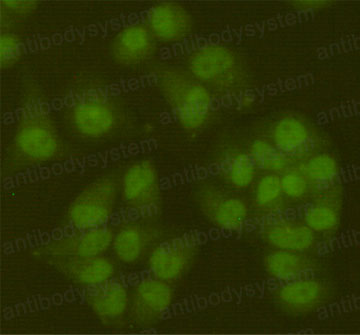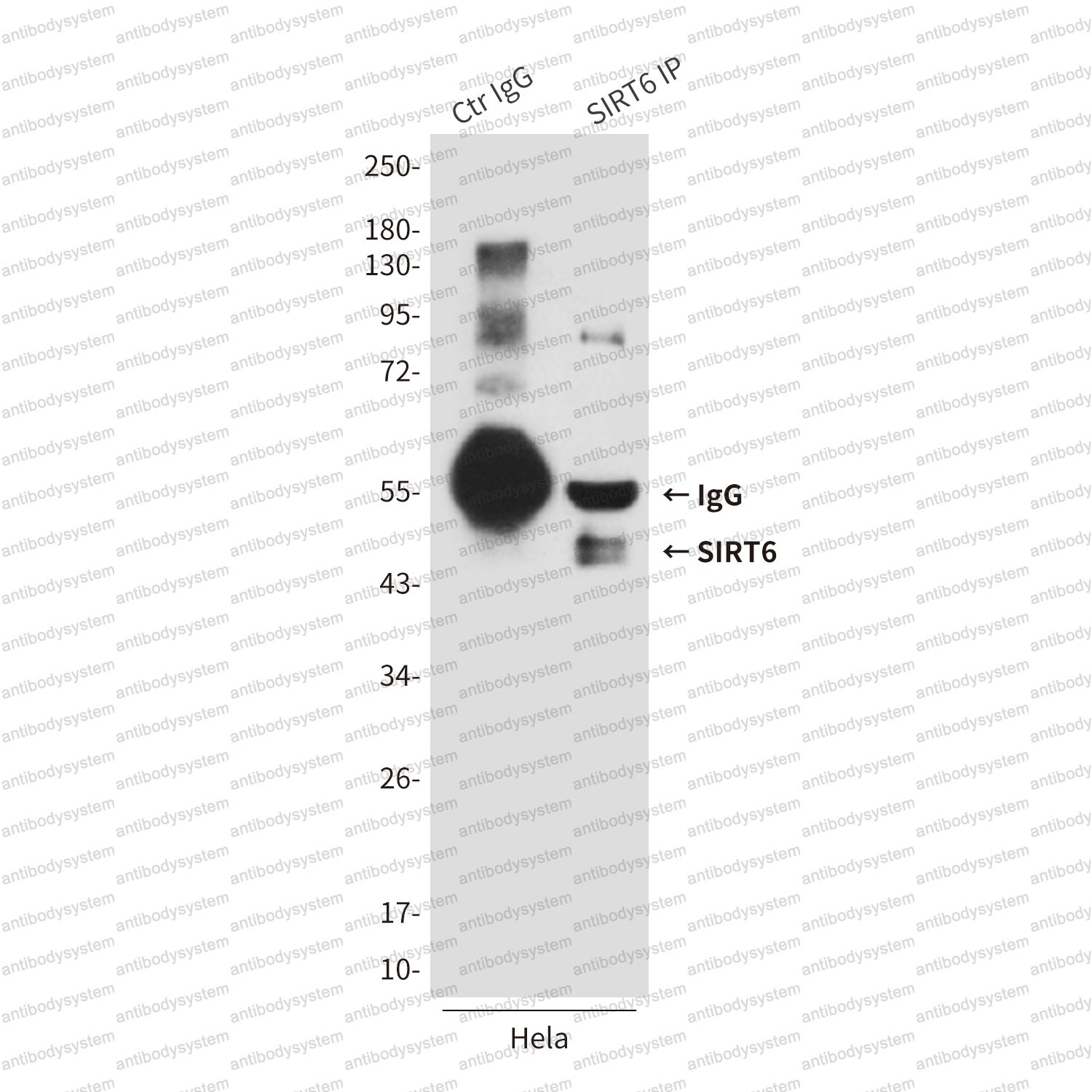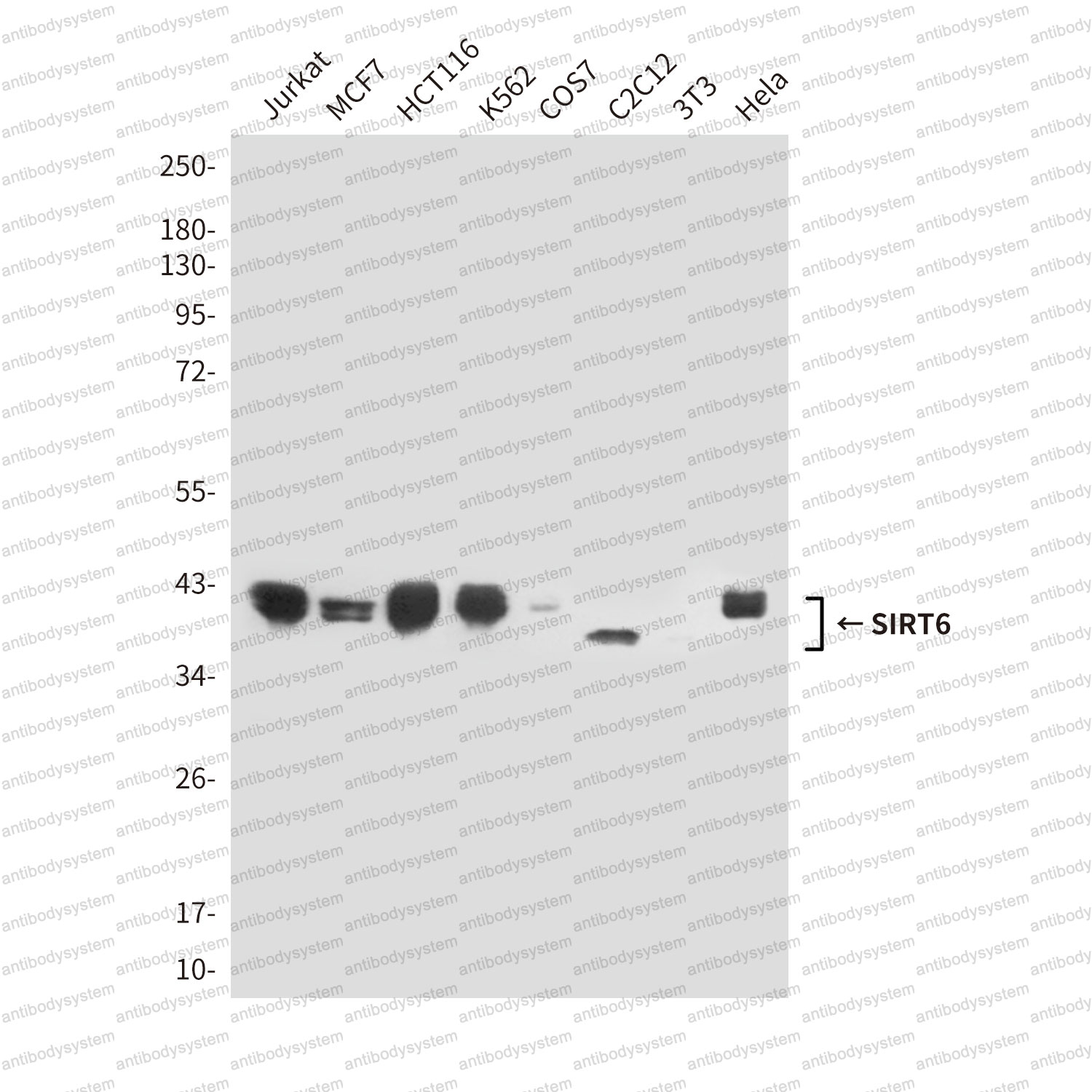Catalog No.
RHJ22902
Species reactivity
Human, Mouse, Rat, Monkey
Host species
Mouse
Isotype
IgG1
Clonality
Monoclonal
Tested applications
IF: 1:50-1:200, IP: 1:20, WB: 1:500-1:1000
Target
SIR2-like protein 6, SIRT6, NAD-dependent protein deacetylase sirtuin-6, SIR2L6, Regulatory protein SIR2 homolog 6
Concentration
1 mg/ml
Endotoxin level
Please contact with the lab for this information.
Purity
>95% as determined by SDS-PAGE.
Purification
Protein A/G purified from cell culture supernatant.
Accession
Q8N6T7
Applications
IF, IP, WB
Form
Liquid
Storage buffer
0.01M PBS, pH 7.4, 0.5% BSA, 0.05% Sodium Azide and 50% Glycerol.
Stability and Storage
Use a manual defrost freezer and avoid repeated freeze-thaw cycles. Store at 4°C short term (1-2 weeks). Store at -20°C 12 months. Store at -80°C long term.
Clone ID
R3V40
SIRT6 Ameliorates Cancer Cachexia-Associated Adipose Wasting by Suppressing TNFR2 Signalling in Mice., PMID:39971710
Sirt6 regulates the Notch signaling pathway and mediates autophagy and regulates podocyte damage in diabetic nephropathy., PMID:39754634
SIRT6 suppresses colon cancer growth by inducing apoptosis and autophagy through transcriptionally down-regulating Survivin., PMID:38986922
TSPAN8+ myofibroblastic cancer-associated fibroblasts promote chemoresistance in patients with breast cancer., PMID:38569015
A bifunctional anti-PCSK9 scFv/Exendin-4 fusion protein exhibits enhanced lipid-lowering effects via targeting multiple signaling pathways in HFD-fed mice., PMID:37739280
Preparation of polyclonal antibodies against the Drosophila deacetylases SIRT 6 and SIRT 7., PMID:37460032
Overexpression of SIRT6 alleviates apoptosis and enhances cell viability and monoclonal antibody expression in CHO-K1 cells., PMID:37286776
Serum circulating sirtuin 6 as a novel predictor of mortality after acute ischemic stroke., PMID:36443316
Protein succinylation associated with the progress of hepatocellular carcinoma., PMID:36308411
MicroRNA-338-3p as a novel therapeutic target for intervertebral disc degeneration., PMID:34531509
Hepatic SIRT6 deficit promotes liver tumorigenesis in the mice models., PMID:35782983
Sirt6 Alleviated Liver Fibrosis by Deacetylating Conserved Lysine 54 on Smad2 in Hepatic Stellate Cells., PMID:32535965
Potential therapeutic effects of cyanidin-3-O-glucoside on rheumatoid arthritis by relieving inhibition of CD38+ NK cells on Treg cell differentiation., PMID:31661005
NAD metabolism fuels human and mouse intestinal inflammation., PMID:28877980
Sirt6 alters adult hippocampal neurogenesis., PMID:28644902
Assessing the Histone Deacetylase Activity of SIRT6 in Primary Murine Hepatocytes via Proximity Ligation Assay., PMID:27761819
Amine functionalized ZrO2 nanoparticles as biocompatible and luminescent probes for ligand specific cellular imaging., PMID:32262067
Expression of SIRT2 and SIRT6 in retinoblastoma., PMID:25660418
Loss of vascular endothelial growth factor A (VEGFA) isoforms in granulosa cells using pDmrt-1-Cre or Amhr2-Cre reduces fertility by arresting follicular development and by reducing litter size in female mice., PMID:25658474
MDM2-mediated degradation of SIRT6 phosphorylated by AKT1 promotes tumorigenesis and trastuzumab resistance in breast cancer., PMID:25074979
The role of SIRT6 in the differentiation of vascular smooth muscle cells in response to cyclic strain., PMID:24495875
SIRT6 protects human endothelial cells from DNA damage, telomere dysfunction, and senescence., PMID:23201774
Sirtuin 6 (SIRT6) rescues the decline of homologous recombination repair during replicative senescence., PMID:22753495
Mechanism-based affinity capture of sirtuins., PMID:21184005
SIRT6 deficiency results in severe hypoglycemia by enhancing both basal and insulin-stimulated glucose uptake in mice., PMID:20847051
Mouse Sir2 homolog SIRT6 is a nuclear ADP-ribosyltransferase., PMID:15795229



